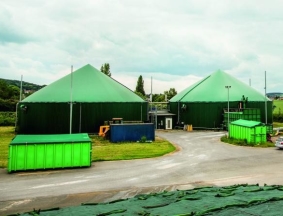Biogas is a type of renewable energy that is produced by the breakdown of organic matter, such as agricultural waste or sewage, in the absence of oxygen. This process, known as anaerobic digestion, results in the production of methane (CH4) and carbon dioxide (CO2) which can be captured and used as a source of energy.
Testing feedstock for biogas potential allows for the determination of the amount of biogas that can be produced from a specific type of organic material, such as maize, wholecrop cereals etc. The results can be used to optimise the biogas production process and improve the efficiency and economic viability of the biogas production system.
We can test this theoretically using proximate analysis of fat, protein and carbohydrate (which is a much cheaper and quicker method), or we can measure the actual biogas potential by measuring the breakdown in a mini digester over 28 days.

